Churches in common unity celebrate the Fast of the Ninevites.
The Fast of the Ninevites, commonly known as the Rogation or Petition of the Ninevites (Classical Syriac: ܒܥܘܬܐ ܕܢܝܢܘܝ̈ܐ Bā'ūṯā ḏ-Ninwāyē) is an annual three-day fast observed three weeks before the commencement of the Great Lent.
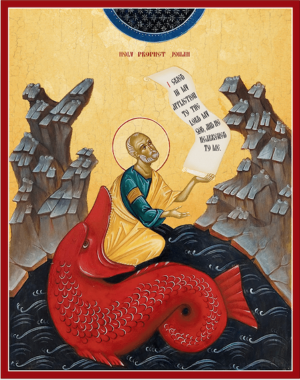 Its origins are rooted in the biblical narrative of Jonah (Book of Jonah, chapter 3). Jonah was instructed by God to visit the Assyrians of Nineveh, preach to them and tell them to repent. The Rogation of Ninevites was later introduced in the 7th century by Marutha of Tikrit, the Maphrian of the Syriac Orthodox Church, the fast was initiated during a plague that afflicted the Sasanian Empire in the Assyrian region of Nineveh.
Its origins are rooted in the biblical narrative of Jonah (Book of Jonah, chapter 3). Jonah was instructed by God to visit the Assyrians of Nineveh, preach to them and tell them to repent. The Rogation of Ninevites was later introduced in the 7th century by Marutha of Tikrit, the Maphrian of the Syriac Orthodox Church, the fast was initiated during a plague that afflicted the Sasanian Empire in the Assyrian region of Nineveh.
The Metropolitans of Adiabene, the ecclesiastical region of modern-day Nineveh (Mosul), Kirkuk and surrounding cities, responded to the crisis by calling for three days of fasting and penitence, drawing inspiration from their Ninevite ancestors in the Book of Jonah.
Today, thirteen Churches, including the Assyrian Church of the East, Chaldean Catholic Church, Syro-Malabar Church, Maronite Catholic Church, Syriac Orthodox Church, Coptic Orthodox Church, Ethiopian, and Eritrean Orthodox Churches, and others, practice this fast.
In 2024, the fast was strictly observed from January 22 to 24 and will be observed from February 26 to 28 in the Orthodox tradition, just before the commencement of Lent. Congregants engage in fasting and prayer, seeking peace and protection for those suffering, especially the instability faced by Christians in the Middle East. The Church expresses gratitude to the Lord for His abundant grace and mercy bestowed upon His children, thanking Him for His immeasurable love.
The three-day fasting period symbolises the duration Jonah spent in the belly of a great fish—three days and three nights (Book of Jonah 1:17). Throughout this fasting observance, believers abstain from food, with some refraining entirely until after morning vespers. A vegan lenten diet is maintained until the service of Thanksgiving held on the Thursday morning following the conclusion of the three-day lent.
Within the fasting duration, the church engages in a rhythm of three days marked by prayers and vespers during the daytime. In the evenings, special services are conducted, providing faithful attendees with opportunities for spiritual commitment and upliftment. This structured approach to prayer and worship during the fast reflects a collective dedication to spiritual growth and reflection within the community.
In addition to the specific observance of the Fast of the Ninevites, the Churches strongly encourage all faithful to partake in this important fast, fostering a collective commitment to spiritual discipline and self-reflection as they prepare for the solemn season of Lent. This shared fasting experience serves as a unifying spiritual practice, emphasizing the significance of repentance, prayer, and solidarity among believers across diverse Eastern Christian traditions.
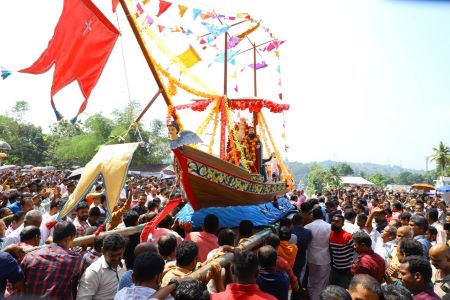
Left: The Syro-Malabar’s annual procession for Rogation of Ninevites
Major Archiepiscopal Marth Mariam Pilgrim Church in Kuravilangad, the ritual of “kappalottam”
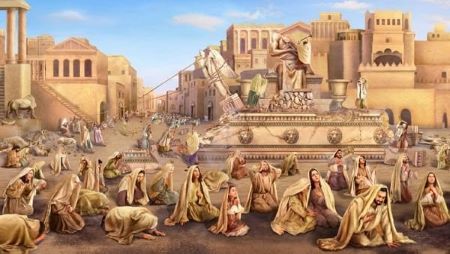 |
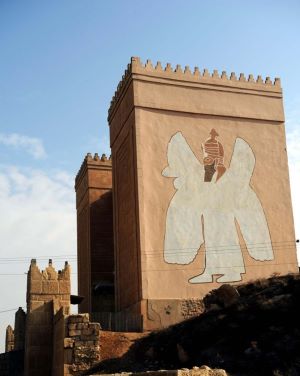 |
|
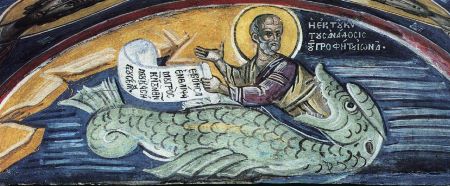 |
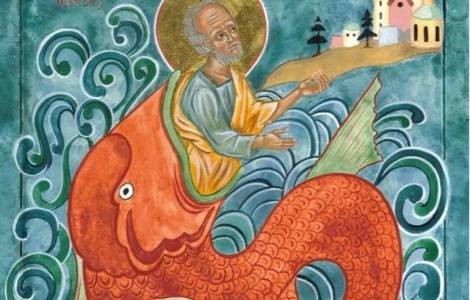 |












